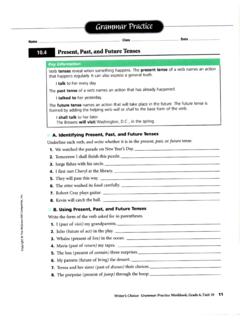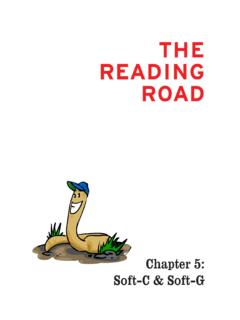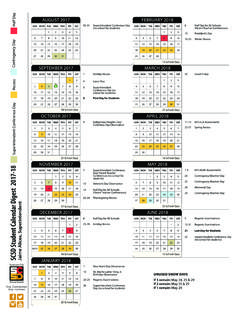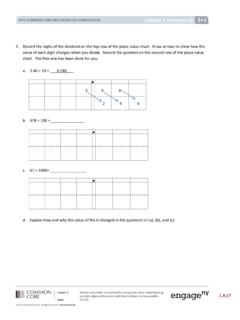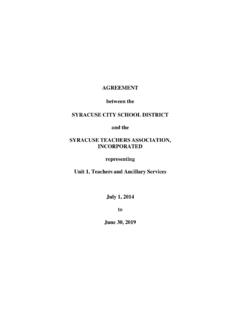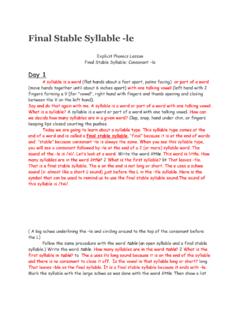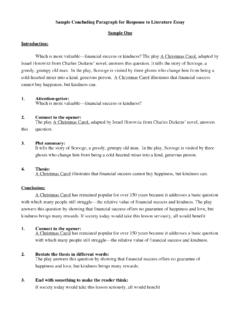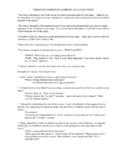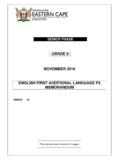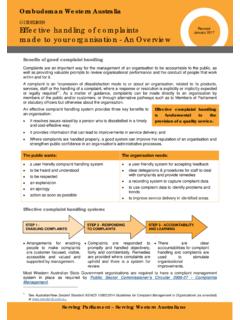Transcription of GREEK AND LATIN ROOTS, PREFIXES, AND SUFFIXES
1 GREEK AND LATIN ROOTS, prefixes , AND SUFFIXES This is a resource pack that I put together for myself to teach roots, prefixes , and SUFFIXES as part of a separate vocabulary class (short weekly sessions). It is a combination of helpful resources that I have found on the web as well as some tips of my own (such as the simple lesson plan). Lesson Plan Ideas .. 3 Simple Lesson Plan for Word Study: .. 3 Lesson Plan Idea 2 .. 3 Background Information .. 5 Why Study Word Roots, prefixes , and SUFFIXES ? .. 6 LATIN and GREEK Word Elements.
2 6 LATIN Roots, prefixes , and SUFFIXES .. 6 root , Prefix, and Suffix Lists .. 8 List 1: MEGA root list .. 9 List 2: Roots, prefixes , and SUFFIXES .. 32 List 3: Prefix List .. 42 List 4: GREEK Roots .. 43 List 5: GREEK prefixes .. 43 List 6: GREEK SUFFIXES List .. 44 List 7: LATIN and GREEK word roots .. 45 Sample Study Card .. 47 Games/Activities .. 48 Word Webs .. 48 Nonsense Words .. 48 Concentration .. 49 Crossword Puzzles .. 49 Word Searches .. 49 Hangman .. 49 Jeopardy .. 49 Quizzes .. 49 Tips .. 49 Lesson Plan Ideas Simple Lesson PlanSimple Lesson PlanSimple Lesson PlanSimple Lesson Plan for Word Studyfor Word Studyfor Word Studyfor Word Study:::: This is a simple plan I made up based upon what I came across on the web: 1.
3 Choose one (or two) new root (s), prefix(es), or suffix(es) a week to learn 2. Have student list as many words as he/she can with the target root , prefix or suffix. 3. Create a study card as shown near the end of this document. 4. Play games or other activities to practice the root , suffix, or prefix. 5. Work in regular review of all previous roots. You might make a warm up activity or give a quiz at the beginning of each session. Lesson PlanLesson PlanLesson PlanLesson Plan Idea 2 Idea 2 Idea 2 Idea 2 Excerpted from: Learning How to Define and Use root Words Procedure: Students will be grouped into groups of four.
4 Each group will be given 10 of the roots from the master list provided by the instructor; each group will get different roots from the master list. Students in each group will use a marker to write each of the 10 roots on an index card. Students will think of two or three words that use the root and write each of these words on the opposite side of the index card. They will write the definition next to each word. (If they are unsure of the definition, they will be allowed to use the dictionary.) They will then attempt to find the similarity for each word; in this way they will attempt to define the root .
5 Example: the students write ject on one index card. On the reverse side, they may come up with inject , reject , and project . Students may discuss that all three words have something to do with movement. Moving in , moving back and moving forward . Students may then infer that ject means to move or to throw . Inject =throw in, reject =throw back, project =throw forward. (Time permitting, students should be encouraged to write on the card one or two more complex words using ject projection , conjecture , objection.)
6 Students in each group will then pair, and each pair will follow the same procedure for each of the five roots they have chosen. The two pairs of students will then share their findings and write their ten roots and definitions in their notebooks (or on the master list). If there is time remaining, the four students will use an open sorting technique to sort their ten roots. For example, they might group by roots that are verbs and roots that are adjectives ( ject pel cred scope aud =verbs; bio belli fort therm temp(o) =nouns.)
7 The time frame for this activity should be 45-50 minutes, one class period. (For subsequent activities involving the same lesson, the groups would share their findings with the class for the next day or two, until all the roots are defined. A possible final activity at this point, instead of a test, would be for each student to group all of the roots from the master list using an open sort. This, again, could be instead of a test, or this could be used as a study mechanism for each student to learn the meaning of the roots for a test, as studies show that grouping improves the learning process.)
8 Evaluation: The instructor will give students a list of new words using the roots defined by each group. The students will attempt to define these words without the use of dictionaries. Students will create nonsense words using a combination of the roots learned and be able to define these words: biocredography = a believable book about someone s life; thermoscope =a device that lets you see the heat given off by an object. A more standard evaluation would be a test on the roots where the student would be given a series of roots; he would have to first define the root , then use a word that uses the root , then define the word: belli =war, belligerent , belligerent =a warlike person, an aggressive person.
9 Background Information Read over the information on the next two pages with student before starting word study so he/she can understand the importance/significance or reason for undertaking this study. Why Study Word Roots, PrefixesWhy Study Word Roots, PrefixesWhy Study Word Roots, PrefixesWhy Study Word Roots, prefixes ,,,, and SUFFIXES ?and SUFFIXES ?and SUFFIXES ?and SUFFIXES ? Knowing the "building blocks" of the English language - prefixes , SUFFIXES and root words - helps you to understand a word's meaning and spelling convention.
10 LATIN and GREEK Word ElementsLatin and GREEK Word ElementsLatin and GREEK Word ElementsLatin and GREEK Word Elements English is a living language, and it is growing all the time. One way that new words come into the language is when words are borrowed from other languages. New words are also created when words or word elements, such as roots, prefixes , and SUFFIXES , are combined in new ways. Many English words and word elements can be traced back to LATIN and GREEK . Often you can guess the meaning of an unfamiliar word if you know the meaning.
